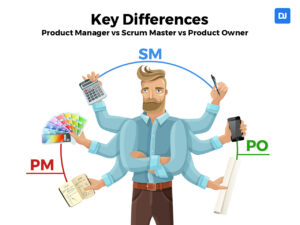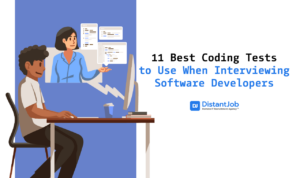Some of the most successful and talented programmers in the world weren’t able to pass the most common feature of the average programming interviewing questions for a coding position.
What feature? The dreaded whiteboard. This is a common practice in the IT hiring world. Applicants for coding positions prove their skills by solving problems on a whiteboard. Of course, they do this without access to external reference material. We’re talking about a practice not dissimilar to ancient school exam techniques.
Now that most of the world is in a remote work setting, it becomes even more important to understand how to conduct interviews rightly – especially for technical positions. The best interview coding questions don’t just revolve around coding and an effective interview process can’t rely solely on the lines of code a candidate writes on a whiteboard.
The Backstory – What Top Programmers Have to Say
A few years ago, David Heinemeier Hansson started a Twitter trend about this practice. David is the creator of the popular Ruby on Rails coding framework.
Here’s what top performers in the programming field have to say:
Do you see where this is heading? Let’s say that if these expert programmers went to an interview at your company, you’d probably be willing to kill baby kittens with a can opener to make these people work for you. They’re the best talent and only a fool wouldn’t want to hire them. If you asked them the programming interviewing questions you usually do, you’d end up on the losing end.
Your Programming Skills Interview
What if you had them take the whiteboard interview test? They would all fail miserably! Your interviewers would send them away. “Don’t call us, we’ll call you (not really)”
And this is how you miss out on amazing talent. By confusing long-standing practices with best practices.
It’s high time for recruitment teams to understand the right programming interviewing questions and methods. The right screening of candidates is important in order to ensure that you hire the right candidate for your team.
Remember: coding is a creative endeavor. The best programmer is not the one that crams all night before a job interview and has all the formulas in their head. Programming is about mindset, about finding efficient solutions. Anyone can look up formulas and standard code. Creativity takes talent and effort. Focusing on technicalities in a job interview is a lazy way of evaluating candidates.
How DistantJob Approaches Coding Questions for Candidates
It’s clear that a whiteboard tells nothing about a developer. It is quite misleading and in fact, can make you hire the wrong person.
At Distantjob, we prefer asking simpler questions that spark meaningful conversations, allowing us to understand how someone thinks. The discussion matters far more to me than the actual lines of code.
So, what are the programming interviewing questions you need to ask? How will you evaluate a potential candidate for a remote programmer or developer position?
Here are some of the common programming interviewing questions in 2024 that will give you a much clearer picture.
1. Hard Skills
Testing for hard skills is all about looking for technical capability in the candidate. How well do they know their subject? Here’s how you can find out.
- How will you find duplicate characters in a string?
Dive a little deeper and be specific about the programming language. Look for a detailed answer that’s not too long. This question will help you figure out how interested the candidate is in the field and the level of their basic technical ability as well.
- Which programming languages do you know and work in?
Listen carefully to understand the candidate’s area of expertise. They should have basic knowledge of at least 3 programming languages even if they aren’t absolute experts at all.
- What’s the biggest programming mistake according to you?
Whichever mistake they talk about, gauge the extent of the actual mistake yourself. Had the candidate mentioned a very small mistake as a big one? In that case, they’re micromanagers who might not be a good fit for senior positions.
On the other hand, is the candidate not mentioning something major like “not testing before release”? In this case, the programmer is too lenient and this could mean sloppy work.
- Give them a small project to work on
You can test the skills of the developer by giving them a small project or task to work on. This will tell you a lot about not only the skills but about their pace, workflow and project management skills as well.
2. Soft Skills
Surprisingly, most interviewers completely skip this part in their programming Interviewing questions when in fact, this is one of the most important skills to look for. If you’re looking for a remote programmer for your next project then this becomes even more relevant.
Soft skills are important for a collaborative environment when a lot of members work together on one project. It is very important that the candidate fits your values and culture well to be able to become a part of your business ethos.
There’s a popular saying which goes something similar to this – Skills can be taught, attitude can’t be.
You need to ensure that the candidate you’re interviewing also fits your company culture. Their personality and overall values need to be aligned with how your business functions and communicates.
Here’s how you can put that to test.
- When you led a project in the past, how did you start? What were your learnings from the same?
Look for how the candidate prioritized during the project and the overall project management skills. If they haven’t managed any project before, ask them if they’d like to and see how they react to that. If they’re eager to lead a project, ask them how they’ll do so.
- Think of a time when everything went wrong at work or in a project. How did you navigate through this situation?
Check how they approach problems. Do they try and solve everything by themselves or do they believe in teamwork? The best candidates will also highlight the mistakes they made and how they’ll avoid those in the future.
- What work environment would you consider ideal?
This is the most important question here. If you’re hiring a remote candidate, they should be comfortable collaborating and working with other teammates from across the world. They should be willing to learn and use different kinds of virtual software as well.
- What made you choose programming as a career? What are your goals for the future?
This question might sound cliche but the cues you get from it can literally make it break the candidate’s chances of being hired.
Here you need to wear your psychology hat and assess the genuine interest level of the candidate. Did their love for math and logic really inspire them to become a coder or was it parental/peer pressure?
As far as goals are concerned, they should have some interesting answers not just in accordance with your business but also for the whole world. Maybe something like developing a life changing piece of tech with their skills?
Check Candidates The DistantJob Way
So what should you focus on when hiring then? The common programming interviewing questions are only a part of the general vetting process. Well, the DistantJob official party line is: focus on what matters to you! With the above-mentioned outline, it will be a lot easier for you to narrow down your list of candidates.
Every company is unique. Every business has its own unique requirements.
What about when we at DistantJob hire for ourselves?
We focus on culture first. We try to figure out if working with us is good for the prospect and for us. We try to find out if we’ll enjoy working with him or her. Fit comes first.
Then, we check for body of work. We ask the right questions to find out the person’s’ ability to perform to our standard.
So if you’re a company asking for our advice, we’d lean toward this method. But in the end, you should ask what matters the most to YOU.
Our clients don’t have to worry about silly whiteboard tests when interviewing. That’s because we have a full, international team of expert headhunters. They check the curriculum and actual coding work of our prospects.
When you sit to interview our candidate, technical excellence is already a given. You don’t need to worry about it. The programming chops of the person sitting (virtually) in front of you are already proven. Are already a forgone conclusion. And all you need to do is focus on figuring out if they are a right fit which means together we will need to assess the candidate’s attitude and soft skills You’ll not be alone, not while hiring, not while onboarding. DistantJob assists you all along. Think how nice that is.
It is nice! Need an expert coder? A genius programmer? Ditch the whiteboard and hire DistantJob. Get in touch with us and we’ll take care of all the hard lifting.





